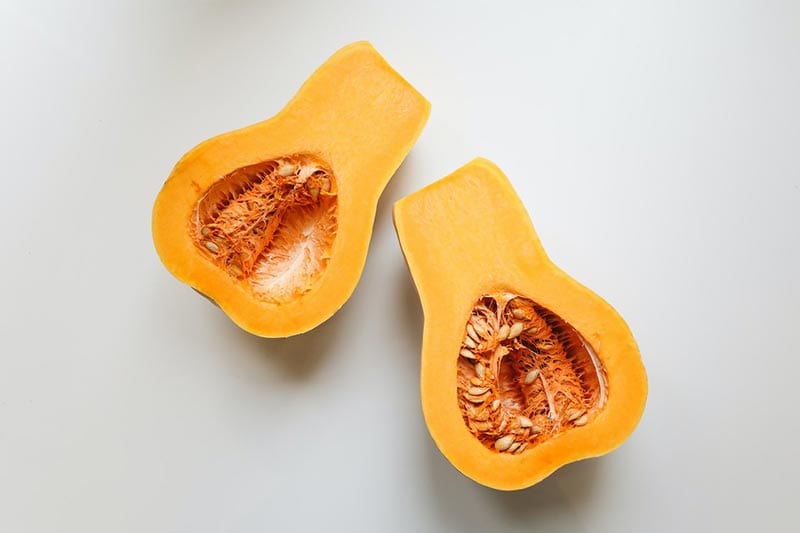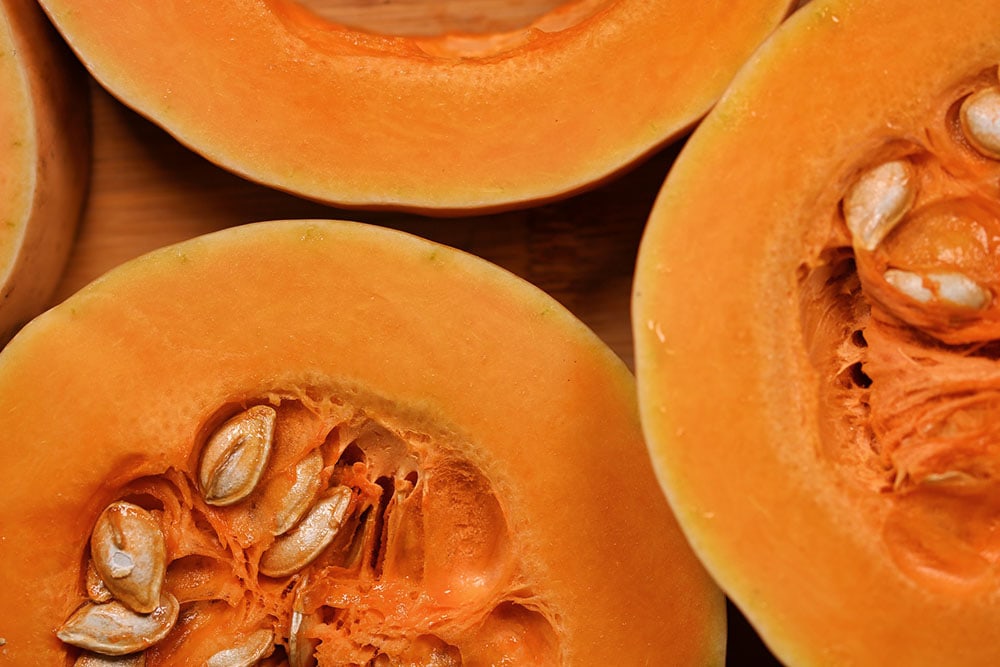
Butternut squash is a healthy food for humans to consume. Many people consider butternut squash a vegetable, but did you know it’s actually a fruit? This delightful fruit is loaded with nutrition, such as vitamins A, C, and E. Butternut squash also contains fiber, antioxidants, magnesium, calcium, iron, phosphorus, potassium, and copper – what’s more, it’s low in calories.
With all the nutritional benefits it provides for humans, does it provide the same benefit for cats? Can cats eat butternut squash? Yes, cats can safely eat butternut squash as it is not toxic to cats, however it is not a necessary part of their diet.
 How to Feed Butternut Squash to Your Cat
How to Feed Butternut Squash to Your Cat
Cats are obligate carnivores, meaning they require meat in their diet. Cats can be finicky with their food, and they may turn their nose up if you offer this winter squash. There is no nutritional need for them to have butternut in their diet but it is safe as an occasional addition.
It’s important to skip any seasonings when giving butternut squash to your cat. Butternut squash already has a natural nutty and sweet flavor, so there’s really no need to add spices or seasonings anyway, especially if feeding to your cat. Ensure you cook the squash, as raw butternut squash may prove difficult for your cat to digest. Remember that cats are obligate carnivores, and their digestive system is built to digest mostly meats.
Before you start, peel the squash and scoop out the seeds. Cut the squash into 1-inch cubes. You can boil the squash or simply bake it in the oven. You want a soft consistency so you can easily mash up the squash. You can also puree the squash in a blender for an even smoother consistency. You can then mix a small amount of the squash with your cat’s food or simply put a tablespoon into your cat’s food bowl.

How Often Can I Feed My Cat Butternut Squash?
Butternut squash should be given as an occasional treat only and not on a daily basis. Treats should account for only 10% of your cat’s daily diet. Butternut squash also has natural sugar, and feeding too much can cause your can to gain weight, which can lead to obesity. More importantly it may fill up your cat and mean that they are not hungry for their more cat-appropriate food. Keep in mind that butternut squash should never replace your cat’s regular food and is not a necessary part of their diet.
Can I Feed Butternut Squash to My Constipated Cat?
Yes! Butternut squash is an often used home remedy for constipation in cats due to its high fiber and water content, which it is said can help regulate the digestive system. Butternut squash can also aid in loose stools for your cat, as the fiber content will bulk up the stool. However, the amount of fiber is not likely to be enough for cats with consistent constipation and you should discuss diet with your veterinarian.
We should note that although rare, some cats might be allergic to butternut squash, and if you feed any to your cat, monitor for signs of an allergic reaction that could include the following:

Tips for a Healthy Cat Diet
Always feed your cat a complete and balanced diet designed for cats. Cats naturally have a low-thirst drive, so feeding a mixture of wet and dry food is recommended to keep your kitty hydrated. Canned food typically offers 78% water content as opposed to the 5%–10% in dry food. Your veterinarian is an excellent source to use for recommendations regarding what to feed and how much daily.
 Final Thoughts
Final Thoughts
Butternut squash is a tasty fruit that offers potential nutritional benefits for cats. A good rule of thumb is to provide butternut squash in moderation and only as a treat, or you can use it to relieve constipation or diarrhea for your cat if directed to do so. In that case, your veterinarian can inform you how much to give.
See Also:
Featured Image Credit: Freedomnaruk, Shutterstock

 How to Feed Butternut Squash to Your Cat
How to Feed Butternut Squash to Your Cat



